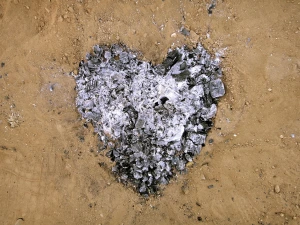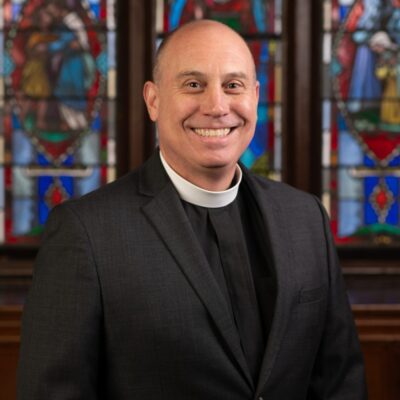Third Week in Lent, Year C
For those of you who heard last week’s sermon featuring the eagle pair, Jackie and Shadow and their three eaglets, I have a sad update. During the tremendous snowstorm that dropped 2 feet of snow on their nest and despite Jackie’s sacrificial effort covering her chicks with her body and wings for over 24 hours, one of the larger chicks became unprotected and froze to death.
People from all over the nation and world shared their grief. We have come to care about these wild birds living on top of a pine tree above a lake in California. There was real sadness around this death. There was also grave concern. Some wondered why the eagles laid their eggs in such an unforgiving place in the middle of winter. Others blamed Jackie for not noticing that one of her chicks was uncovered. Some wondered why a rescue operation hadn’t been staged by those who operate the cameras. Finally, one person couldn’t understand why no one had installed an umbrella or roof above the nest!
Of course, the answer to all these concerns is that this is nature in all its wildness, beauty and danger. Any of the suggested human interventions would have drastically tampered with the wellbeing of these birds and might certainly have caused harm.
But this is what we humans do. When bad things happen we want to assign blame. We think we would have handled this situation better. Someone or somebirdy must have done something wrong. We are sure this could have been prevented with better controls and more care.
When some report to Jesus about the Galileans who were slaughtered by the Roman Governor Pilate while performing their religious rituals, they wonder if these folks had done something to deserve their fate. I’m sure it was frightening and they wanted to prevent the same persecution from happening to them and those they love. Jesus answers clearly that these were no worse sinners than anyone else. In other words, it could have been any of them. All are equally at risk under the violent Roman occupation of Judea.
Jesus adds a second example. He brings up the building collapse in Siloam where 18 people were killed. Were those who died worse than everyone else who escaped? Did God have a reason for their deaths? Again, Jesus clearly states that they were no more deserving of death than anyone else.
It is important to note that Jesus does not blame their deaths on either their own behavior or upon God’s judgement. He is warning us not to correlate moral goodness with prosperity or moral depravity with suffering. In God’s eyes we are all equally sinners and we are all equally loved.
This is especially important as Jesus is on his final journey to Jerusalem. There he will encounter terrible suffering, crucifixion and death. Those who love and follow him will scatter out of fear. There will be those who consider him guilty, deserving of punishment and death. His disciples know that if they are willing to kill the one who is innocent, the best and most beautiful of all, then no one will be safe. The same fate as the Galileans may await them.
Jesus himself foreshadows the utter destruction of Jerusalem and its worshipping community by using the example of a falling tower. He has already prophesied about the destruction of the Temple and by linking the persecution of the Galileans with the falling of the tower, he is giving us a vision of what lies ahead for him and for all of them.
Why do this? Why paint such a grim future? If the evil that is coming will touch everyone, even the innocent, even the Beloved Son, then how are we to live?
This is where the parable of the fig tree comes in. Jesus tells them about a landowner who has a large vineyard in which are some fig trees. The vineyard metaphor lets everyone know that he’s speaking about the people of God, the Israelites. Figs and grapes grow in the same type of soil. A fig tree with no figs is a sign that all is not well. The failure of the fig tree to bear fruit may signal that the vines themselves are at risk.
Like the murder of the Galileans and the deaths in Siloam, the barren fig tree warns that there is need for change. This change, Jesus calls repentance. It is the act of turning away from sin and turning towards God and our neighbor. And it is for everyone.
Those who are listening may think that they are not such big sinners. After all, they are religious, they are close to Jesus, they aren’t the oppressors or the faulty builders of towers.
But Jesus’s words are a wake-up call for everyone. It is so much easier to look outside ourselves to identify those who are doing wrong, those who deserve their punishment. Like with the eaglets, maybe the bigger chick was arrogant and thought he could venture out further than the other two. Or maybe Jackie is a negligent mother. Or those who run the cameras failed their responsibilities. In our grief and anger we start blaming others.
Jesus wants us to look closer. When we see the hundreds of people on the street without shelter, adequate clothing or care, is our first reaction to blame them or their parents or the system? What about when we become more aware of the effects of racism or classism? Are we outraged about other people’s behavior while failing to consider our own?
As every day brings more news about radical changes to the systems by which our country is governed and managed, it is easy to feel powerless, angry, grieving and ready to blame. What might it mean, in these situations, to consider repentance?
This is what Paul calls the people of Corinth to do. He warns us all, “So if you think you are standing, watch out that you do not fall.” He is particularly concerned that like their forebears, the people so easily fall into idolatry. They lose sight of the God who loves, cares and provides for them and worship false gods to meet their needs.
It’s so easy for us now to be outraged at those we disagree with and to be fearful of the consequences of their actions. It’s much harder to examine our own lives and those areas where we may be in danger of idolatry. Recently I was describing the Episcopal Church to someone and I mentioned that over 80% of the members have college degrees. I could have also said that the average age is 67 and that over 85% of the members in the U.S. are white. If I were to be very honest I might share that there’s a high level of financial security for a much higher percentage of people than the average American. If pressed I would say we’re proud of our good taste, high social standing and influence. Some of us might be considered “elite.”
In an age of income inequality, increased homelessness, poor care for elders and children and the desperate struggle of refugees and immigrants, my safety and security, education, financial stability and status puts me very much in a privileged minority. “So, if you think you are standing, watch out that you do not fall.”
The question from Jesus’s parable of the fig tree is this. Are you bearing fruit or are you just taking up space?” Are you living into God’s call for you? Does your life reflect what you value? Can you let go of your idols and join Jesus in offering your life in service to God and others? Tough questions and ones we all periodically ask ourselves, particularly during Lent.
But, as always, with Jesus there is a twist to the parable. It’s not an either/or situation. Out of left field the gardener shows up. And this gardener has hope and maybe even love for the barren fig tree. He pleads for another chance. I like his proposal. First of all he’s going to disturb this tree and get its attention by digging up around its foundation. Then he’s going to throw on some manure. You know what that’s like. It’s the proverbial you know what hitting the fan. It may seem like things are getting worse, but this is the best chance for the fig tree. Things cannot go on as they are, but this wake-up call may be just what is needed to turn the tree around and save it.
The purpose of repentance is not to feel bad or to engage in shame and blame. The purpose of repentance is to turn around, to dig deeper, to receive the corrective nutrients we need to flourish. God does not desire the death or judgement of sinners, but rather that we might live and live life abundantly, sharing generously all the gifts we have been given.
Jackie and Shadow took some time before removing their dead chick from the nest. They handled it with care and Jackie flew off with it, where we do not know. At the same time, they have continued to catch fish, feed the surviving eaglets and protect them from predators. They are committed to life.
We, too who worship the one who died and has risen have a call to love and serve. There is work to do.





Leave a Reply